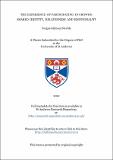The experience of participating in crowds : shared identity, relatedness and emotionality
Abstract
The aim of this thesis is to extend the social identity model of crowd behaviour (Reicher, 1984,
1987, 1996) by exploring the experience of collective participation, with an emphasis upon
quality of within-crowd social relations (‘relatedness’) and collective emotionality. A multi-method research strategy is employed to study these topics at a variety of crowd events. Studies 1
and 2 use ethnography and retrospective interviews at a student protest and public screenings of
football matches to generate hypotheses for subsequent testing. Study 3 then tests these
hypotheses by means of questionnaire data collected during Study 2. Using an experimental
‘visualisation’ paradigm, Study 4 demonstrates the role of shared identity (and not simply self-categorization) in generating relatedness. Studies 5 and 6 present evidence that groups of high
relatedness participants experience identity-relevant stimuli as more emotionally intense than low
relatedness groups. Study 7 concludes the empirical work by using questionnaire data collected at
political protests to test a model of collective experience based upon the findings of the previous
studies. The thesis argues that a perception of shared identity with co-present others can
positively transform social relations towards relatedness (connectedness, validation and
recognition). Relatedness may then be experienced emotionally, and facilitate the realisation of
group goals which may also have emotional consequences. Strength of social identity is also
noted as an antecedent to group-based emotion. In this way the analysis offers three ways in
which social identity may lead to emotionality of collective experience, contradicting ‘classic’
crowd psychology in which crowd emotion was rooted in a loss of identity. Preliminary evidence
is also presented suggesting that the experience of collective participation may have a role to play
in determining future social identification and participation in co-action.
Type
Thesis, PhD Doctor of Philosophy
Collections
Items in the St Andrews Research Repository are protected by copyright, with all rights reserved, unless otherwise indicated.

